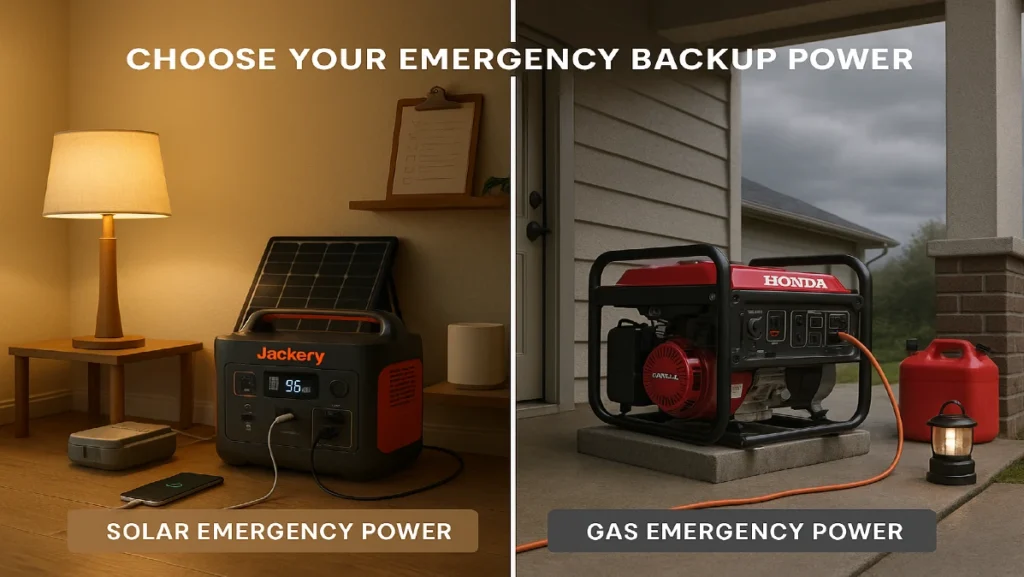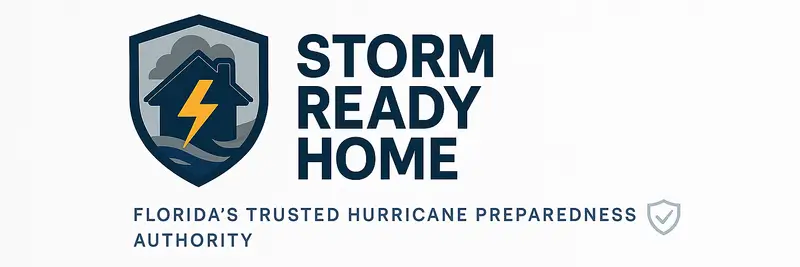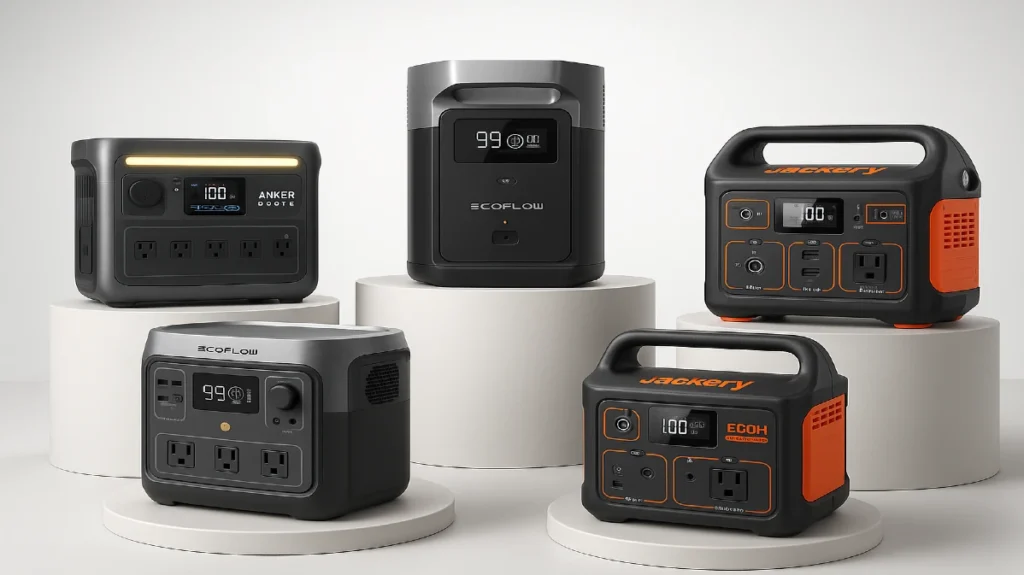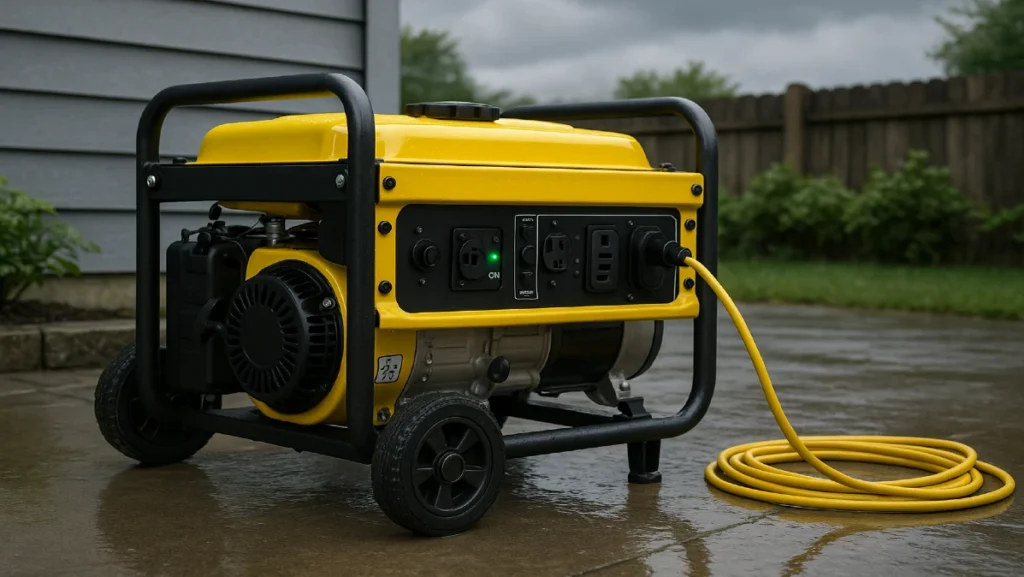
As a researcher, I know how crucial backup power for emergencies has become. Many families face outages yearly. Hurricane Ian taught us that grid collapse can strike without notice. That’s why a reliable home backup plan is essential.
Why Backup Power for Emergencies Is Non-Negotiable
Power loss can endanger health, food safety, and medical devices. During extreme weather in Florida, outages may last days. With solar recharge speeds improving 20% in the last decade, now is the smart time to invest. In contrast, gasoline generators offer prolonged runtime and high immediate output. Both systems serve different needs.
According to the U.S. Department of Energy, the average American household experiences at least one major outage per year, with weather-related blackouts on the rise. Having reliable backup power for emergencies—whether it’s a portable solar generator, lithium battery system, or traditional gas-powered unit—means you can keep vital appliances running, store medications safely, and maintain critical communications. Today’s best backup power solutions are safer, quieter, and more affordable than ever, making it possible for every home to be storm-ready. No emergency preparedness plan is complete without considering the right backup power for emergencies that fits your location, budget, and family needs.
Comparison: Solar vs Gas Backup Power for Emergencies
| Criteria | Solar Generator | Gas Generator |
|---|---|---|
| Runtime | Unlimited with daylight + panels | Depends on fuel stock |
| Emissions & Noise | Silent, zero fumes | Loud, emits CO2 |
| Load Capacity | Great for essentials (fridge, phones) | Suitable for full-house HVAC |
| Cost & Maintenance | Higher upfront; minimal upkeep | Lower upfront; yearly oil + filters |
Solar systems outperform when you only need essentials. Gas generators excel under full-home load. Therefore, my research leans to a hybrid solution—use solar daily, gas in extended crises.
Who Needs Which Backup Power for Emergencies?
- Families with medical needs: Silent solar backup keeps devices running stress-free.
- Remote homes: Gas generators can power well pumps and HVAC for longer spans.
- Frequent storm zones: A switch to solar panels designed with hurricane-grade brackets ensures rapid recovery.
Free Tools & Storm‑Ready Checklist To Guide You
Make storm season less stressful with our interactive Storm Checklist trusted by Florida families and based on official FEMA and Red Cross guidelines.
- Storm-Ready Home: Emergency Preparedness Checklist – Check off supplies, print your list, and get ready before the next storm.
- Storm-Ready Emergency Preparedness Quiz – Instantly see how ready you are and get personalized tips to fill any gaps.
All tools are free, mobile-friendly, and updated for 2025.
Download our free Storm‑Ready Home Checklist to map energy needs, prioritize circuits, and arrange safe fueling zones.
FAQs About Backup Power for Emergencies
What’s the best type of backup power for a blackout?
If you need quiet, clean power for essential devices, a solar generator excels. For whole‑home coverage and high‑wattage appliances, a gas generator is ideal. Many homeowners balance both for full protection.
Can I use a solar generator during a storm?
Yes, but solar charging may slow during heavy cloud cover. Install panels before storm season and ensure your battery is fully charged in advance.
Do I need both solar and gas backup power for emergencies?
Both systems offer unique strengths. Using solar daily protects essentials silently, while gas offers high-output during extended outages. Together, they deliver complete resilience.
💡 Need help choosing? Use our calculators, then get the free checklist. It covers everything your family needs to stay safe during blackouts.
By choosing resilient backup power for emergencies, you protect loved ones and appliances. I continue to analyze product performance data, user reviews, and tech trends. This guide reflects that effort. Stay safe.
✅ Download the Storm-Ready Home Checklist »
🔗 Trusted Emergency Prep Resources
- FEMA: Power Outage Preparedness
- CDC: Generator Safety During Outages
- U.S. Department of Energy: Emergency Energy Planning
- NOAA: Weather Alerts and Storm Planning
💡 Need help choosing? Use our calculators, then get the free checklist. It covers everything your family needs to stay safe during blackouts.
By choosing resilient backup power for emergencies, you protect loved ones and appliances. I continue to analyze product performance data, user reviews, and tech trends. This guide reflects that effort. Stay safe.


